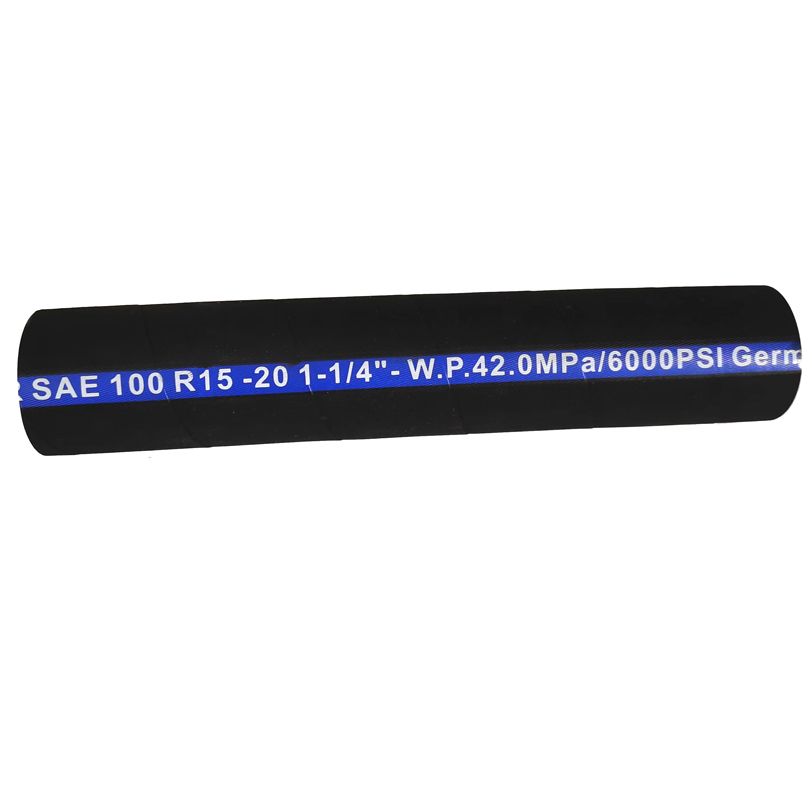335345435
okt . 01, 2024 14:17 Back to list
OEM Two-Wire Braided High Pressure Hydraulic Hose Suppliers and Manufacturers Guide
Exploring OEM Two-Wire Braided High Pressure Hydraulic Hose Manufacturers
In the realm of hydraulic machinery, the importance of high-quality hoses cannot be understated. Among the various types of hydraulic hoses available, two-wire braided high-pressure hydraulic hoses stand out due to their robust performance and versatility. This article delves into the world of OEM (Original Equipment Manufacturer) two-wire braided hydraulic hoses, highlighting their manufacturing processes, applications, and what to consider when choosing a reputable manufacturer.
Understanding Two-Wire Braided High Pressure Hydraulic Hoses
High-pressure hydraulic hoses are essential components in hydraulic systems, designed to transmit fluids and transfer power between different parts of machinery. Specifically, two-wire braided hoses are constructed using two layers of steel wire braids, providing excellent reinforcement against pressure and enhancing their resilience to various external factors such as abrasion, sunlight, and heat.
The two-wire configuration is particularly beneficial for high-pressure applications, allowing these hoses to withstand pressures exceeding 3000 PSI, making them ideal for industries that operate heavy machinery and require reliable hydraulic solutions. Their construction typically incorporates a synthetic rubber core that is compatible with various hydraulic fluids, making them suitable for numerous applications in construction, manufacturing, and agricultural machinery.
Applications of Two-Wire Braided Hydraulic Hoses
These hoses are widely used in various fields due to their adaptability and strength. Common applications include
1. Construction Equipment Excavators, loaders, and cranes often rely on two-wire braided hoses to function effectively under high-pressure conditions while handling heavy loads.
2. Agriculture Tractors and other farming equipment utilize these hoses for efficient power transmission in hydraulic systems, particularly in activities like tilling, plowing, and lifting.
3. Manufacturing Many manufacturing processes require hydraulic systems for quality control, assembly lines, and material handling, making two-wire braided hoses crucial for efficient workflow.
5. Mineral Extraction High-pressure hoses are vital in mining operations for the operation of heavy machinery and for hydraulic fracturing processes.
oem two wire braided high pressure hydraulic hose manufacturers

Selecting a Reliable OEM Manufacturer
Choosing the right OEM two-wire braided hydraulic hose manufacturer is critical for ensuring quality and performance. Here are key factors to consider
1. Certification and Standards A reputable manufacturer should comply with international quality standards, such as ISO, SAE, or DIN. Certification ensures that the hoses meet necessary safety and performance requirements.
2. Material Quality The grade of materials used in the hoses significantly affects their performance and durability. Ensure that the manufacturer uses high-quality synthetic rubber and steel wire that can resist wear and tear.
3. Testing and Quality Control Leading manufacturers conduct rigorous testing on their products, including pressure testing, abrasion resistance, and flexibility tests. Inquire about their quality control measures to ensure reliability.
4. Customization Options Different applications may require hoses of varying lengths, diameters, and fittings. A good manufacturer should offer customization options to meet specific operational needs.
5. Reputation and Experience Research the manufacturer's background, history, and market reputation. Companies with years of experience are more likely to have refined their processes and can offer valuable insights based on industry practices.
6. Customer Support A responsive customer service team is crucial for addressing inquiries, providing technical assistance, and handling warranty matters promptly.
Conclusion
In summary, OEM two-wire braided high-pressure hydraulic hoses are a vital component in numerous machinery applications across various industries. Their robust construction and high-pressure capabilities render them indispensable for effective hydraulic operations. When selecting a manufacturer, it is essential to consider their compliance with standards, the quality of materials used, their testing protocols, customization capabilities, industry reputation, and customer support. By doing so, businesses can ensure they are investing in quality products that will enhance the performance and lifespan of their hydraulic systems.
In a world that increasingly relies on hydraulic technology, selecting the right manufacturer is not just a matter of convenience; it is a critical step toward operational efficiency and safety.
-
SAE 100 R17 Black Smooth Cover Hydraulic Hose
NewsMar.07,2025
-
SAE 100 R17 Black Smooth Cover Hydraulic Hose
NewsMar.07,2025
-
SAE 100 R17 Black Smooth Cover Hydraulic Hose
NewsMar.07,2025
-
SAE 100 R17 Black Smooth Cover Hydraulic Hose
NewsMar.07,2025
-
SAE 100 R17 Black Smooth Cover Hydraulic Hose
NewsMar.07,2025
-
steel wire braided hydraulic hose
NewsMar.07,2025



